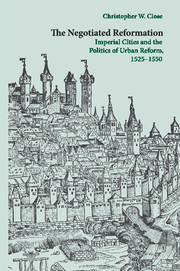Book contents
- Frontmatter
- Contents
- List of Abbreviations
- Acknowledgments
- Map One South German Imperial Cities ca. 1525
- Map Two Imperial Cities in Upper and Eastern Swabia
- Introduction
- 1 Consultation and the Urban Hierarchy
- 2 Imperial Cities and Collective Politics
- 3 Preachers, Consultation, and the Spread of Urban Reform in Southern Germany
- 4 The Urban Reformation in Donauwörth
- 5 The Urban Reformation in Kaufbeuren
- 6 Negotiation and the Rural Reformation in Eastern Swabia
- 7 Eastern Swabia and the Schmalkaldic War
- Conclusion
- Bibliography
- Index
- References
3 - Preachers, Consultation, and the Spread of Urban Reform in Southern Germany
Published online by Cambridge University Press: 26 December 2009
- Frontmatter
- Contents
- List of Abbreviations
- Acknowledgments
- Map One South German Imperial Cities ca. 1525
- Map Two Imperial Cities in Upper and Eastern Swabia
- Introduction
- 1 Consultation and the Urban Hierarchy
- 2 Imperial Cities and Collective Politics
- 3 Preachers, Consultation, and the Spread of Urban Reform in Southern Germany
- 4 The Urban Reformation in Donauwörth
- 5 The Urban Reformation in Kaufbeuren
- 6 Negotiation and the Rural Reformation in Eastern Swabia
- 7 Eastern Swabia and the Schmalkaldic War
- Conclusion
- Bibliography
- Index
- References
Summary
For many burghers in southern Germany, the earliest and most regular contact with reform ideas occurred through evangelical sermons. Preaching was an important if somewhat irregular aspect of fifteenth-century Christianity. The movement of itinerant preachers and the growth of endowed preacherships meant preaching before the Reformation often happened outside the structure of the Mass, which revolved around the miracle of transubstantiation. By contrast, the reformers' rejection of the Mass's sacrificial nature and their emphasis on the Word's primacy elevated preaching to the centerpiece of the new evangelical church services. Through their ministries, preachers influenced the literate and illiterate alike, delivering daily sermons in simple, direct language or composing learned letters of advice for urban councils. They could use the pulpit to build popular support for magisterial reform policies, but their sermons could also challenge councilors to introduce controversial reform initiatives. All the major reformers – including Luther, Zwingli, and John Calvin – were accomplished preachers who recognized the crucial role preaching played in communicating their reform message. It was often through preachers that ideas expressed in theological tracts found initial entrance into the churches and council chambers of southern Germany.
Eastern Swabia's city councils recognized the importance of preachers for the introduction and maintenance of urban reform. During the 1530s and 1540s, magistrates across southern Germany recruited, transferred, and borrowed evangelical preachers in order to staff urban and rural parishes.
- Type
- Chapter
- Information
- The Negotiated ReformationImperial Cities and the Politics of Urban Reform, 1525–1550, pp. 84 - 109Publisher: Cambridge University PressPrint publication year: 2009



